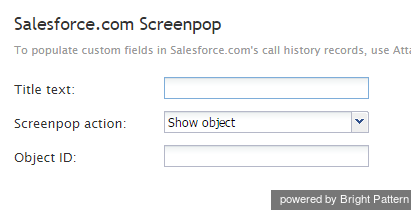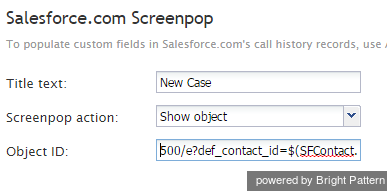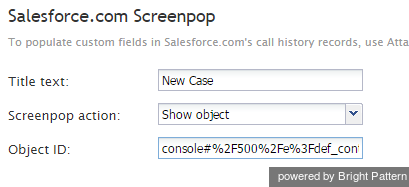SFDCオブジェクト用にスクリーンポップURLの検索または作成
SFDC 統合は、 原則としてSFDCシステム管理者により提供されるスクリーンポップシナリオブロックURLを使うことによって、Saleforce.com (SFDC)の特定のオブジェクトをスクリーンポップ候補とし、アクセスを可能にします。 一方、以下の手順は、SFDCオブジェクトスクリーンポップURLの作成方法を説明する例として挙げられます。
Bright Patternコンタクトセンターは、 Salesforce.com スクリーンポップ シナリオブロックを使って、エージェントデスクトップアプリケーションでSFDCレコード(オブジェクト)を表示します。このブロックは、各オブジェクトIDの選択を許可する他、更にスクリーンポップオブジェクトのSFDC URLを提供します。
ご注意: オブジェクトID URLは、Service CloudとSales Cloudで異なる場合があります。従って、一つのシナリオが企業全体に対応できない場合があります。
Sales Cloudの SFDCスクリーンポップURLの検索
Salesforceを使って, スクリーンポップURLを介して実行したいタスクを手動で実行します。例えば、Sales Cloudにおけるアカウントと特定のコンタクトから新しいケースを開くには、次の手順に従って実行します:
ステップ 1: Select a Sales Cloud アカウントを選んで新しいケースを作成します。
- Sales Cloudから > アカウントを選択します。
- コンタクトスクロールします。
- コンタクトサンプルを選択します。
- コンタクトレコードから ケースまでスクロールし、新しいケースを選択します。図の通り、新しいケースレコード開きます。
ステップ 2: スクリーンポップのSFDCオブジェクトを識別するURLを設定します。
- 先ずは、ページURLをコピーします:
https://bpdemo-dev-ed.my.salesforce.com/500/e?retURL=%2F003E000000NoeJj&def_contact_id=003E000000NoeJj&def_account_id=001E000000NK3Pl - このURLは、スクリーンポップに必要なSFDCオブジェクトパラメータを識別します。SFDC URLの最初のセグメント(https://bpdemo-dev-ed.my.salesforce.com/) は不要ですので、削除します。デスクトップ統合では、設定されたドメインURLが使用されます。結果は次のとおりです:
500/e?retURL=%2F003E000000NoeJj&def_contact_id=003E000000NoeJj&def_account_id=001E000000NK3Pl - オブジェクトパラメータ (contact_id と account_id)は、シナリオにより定義されたオブジェクト/変数に置き換えられます。例えば:
500/e?retURL=%2F003E000000NoeJj&def_contact_id=$(SFContact.Id)&def_account_id=$(SFContact.Account.Id)
備考
一般の オブジェクトIDの識別子 (先頭の3つのフィールド文字により識別)は以下の通りです:
- 001 = アカウント
- 003 = コンタクト
- 00T = タスク
原則として、 retURLまたは Return URLは、特定のオブジェクトに戻る必要がない限り、使用しません。 Return URLを削除すると、既定のアクションは元のワークオブジェクトに戻されます。
- 削除します:
retURL=%2F003E000000NoeJj&
- The Final URL is:
500/e?def_contact_id=$(SFContact.Id)&def_account_id=$(SFContact.Account.Id)
This URL will be placed in the Salesforce.com Screenpop block's Object ID field.
Locating SFDC Screen Pop URLs for Service Cloud (Service Console)
Utilizing Salesforce, perform the desired task manually that you wish to perform via the Screen pop URL. For example, if you are interested in opening a new case from an account and a specific contact within Service Cloud, you should proceed as follows.
Step 1: Select a Service Cloud account and create a new case
- From within Service Cloud, select > Accounts.
- Scroll down to a specific account.
- Select a sample account.
- From the Account record selected, scroll down to Contacts.
- Select a sample contact with which to work.
- From the Contact record, scroll down to Cases, and then select New Case. A new Case record should open.
- To locate the behind-the-scenes URL, select the down arrow on the left side, as shown.
Step 2: Edit the new case
Select New Case and click the edit link. This should result in the Link to Share dialog box.
In Link to Share, three options are available:
- Include all primary tabs and subtitles
- Include only this tab
- Create standard Salesforce URL
Step 3: Configure the URL that identifies the SFDC Object for screen pop
- Select “Include only this tab” to provide the simple URL for the screen pop described.
- Copy the page URL as your starting reference:
https://bpdemo-dev-ed.my.salesforce.com/console#%2F500%2Fe%3Fdef_contact_id%3D003E000000NoeJk%26def_account_id%3D001E000000NK3Pm
The URL identifies the SFDC Object parameters required for your screen pop. The initial SFDC URL segment is not required (https://bpdemo-dev-ed.my.salesforce.com/) and should be removed--the desktop integration will use the configured domain URL. The result is:
console#%2F500%2Fe%3Fdef_contact_id%3D003E000000NoeJk%26def_account_id%3D001E000000NK3Pm
The Object parameters def_contact_id and def_account_id would be replaced by the scenario-defined objects/variables.
The URI data format is as follows (for reference only):
%3D = “=” %26 = “&” %2F = “/” %3F = “?”
Thus the result would be the following:
console#%2F500%2Fe%3Fdef_contact_id%3D$(SFContact.Id)%26def_account_id%3D$(SFContact.Account.Id)
一般の オブジェクトIDの識別子 (先頭の3つのフィールド文字により識別)は以下の通りです:
- 001 = アカウント
- 003 = コンタクト
- 00T = タスク
This URL will be placed in the Salesforce.com Screenpop scenario block's Object ID field:






